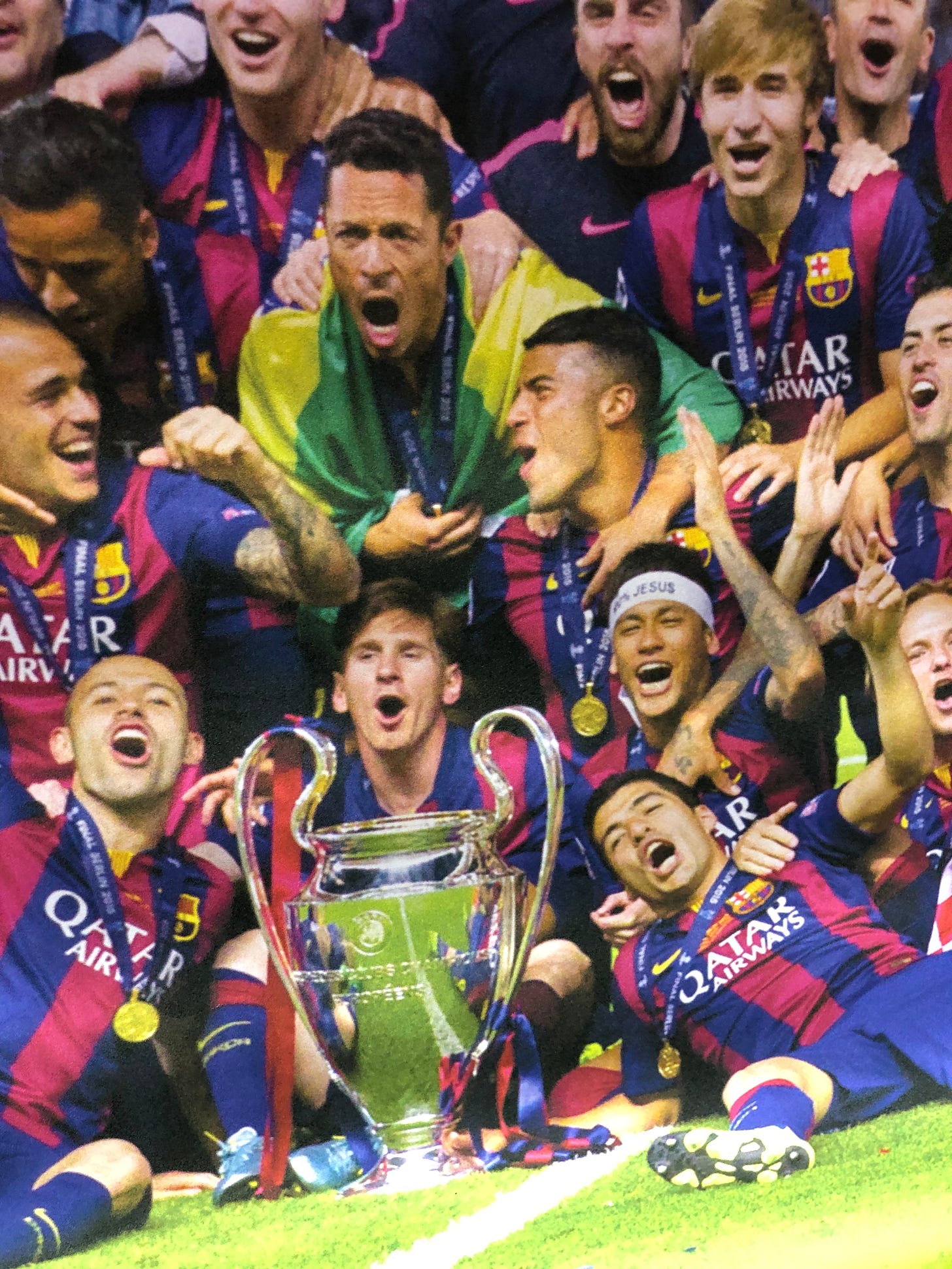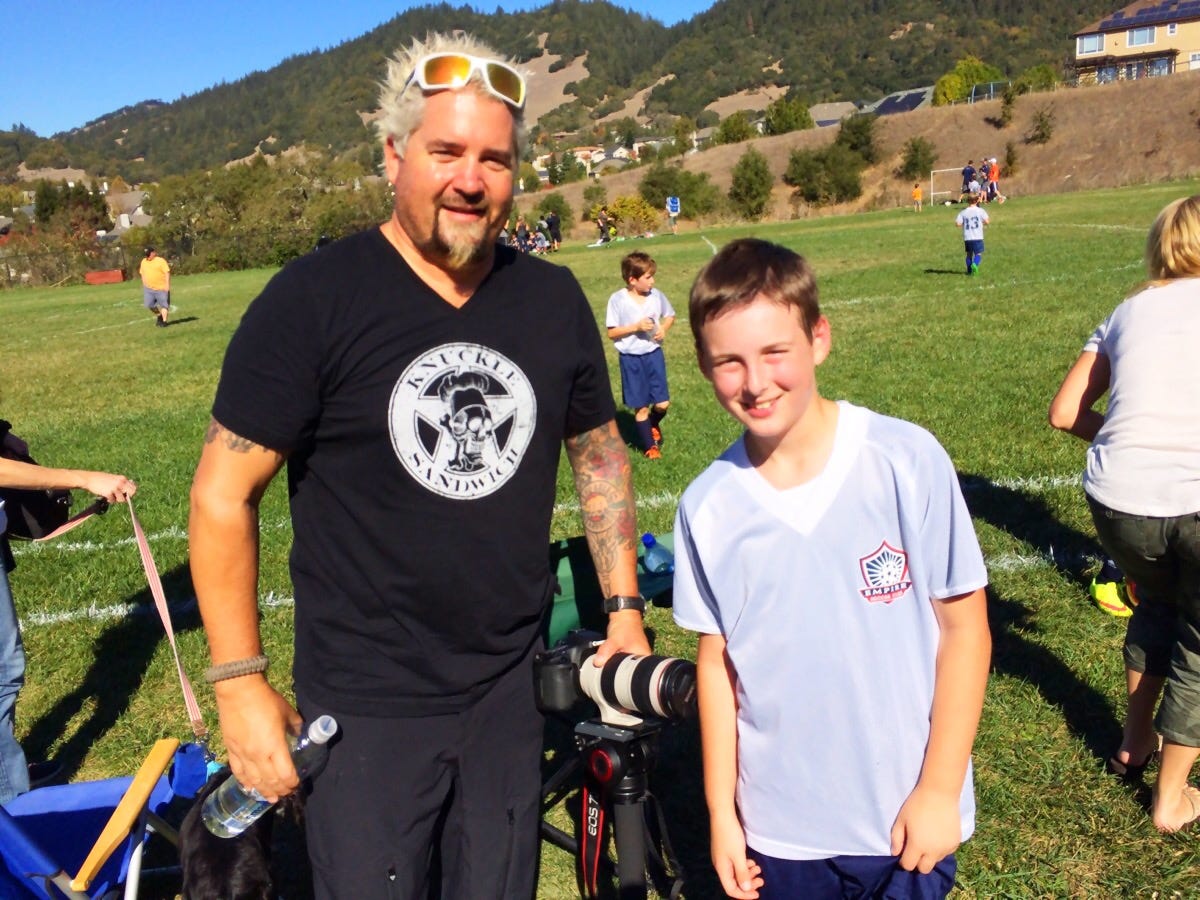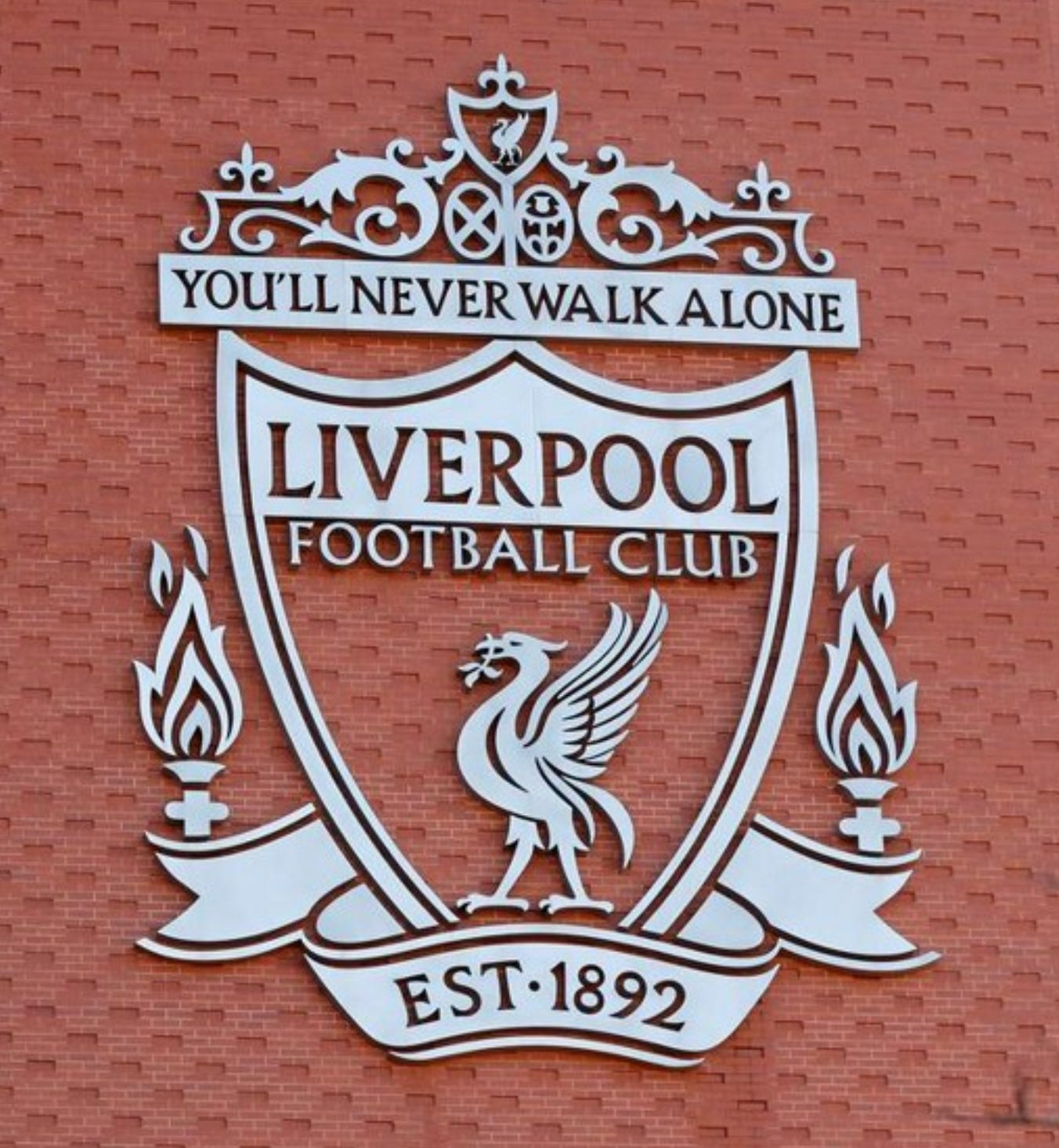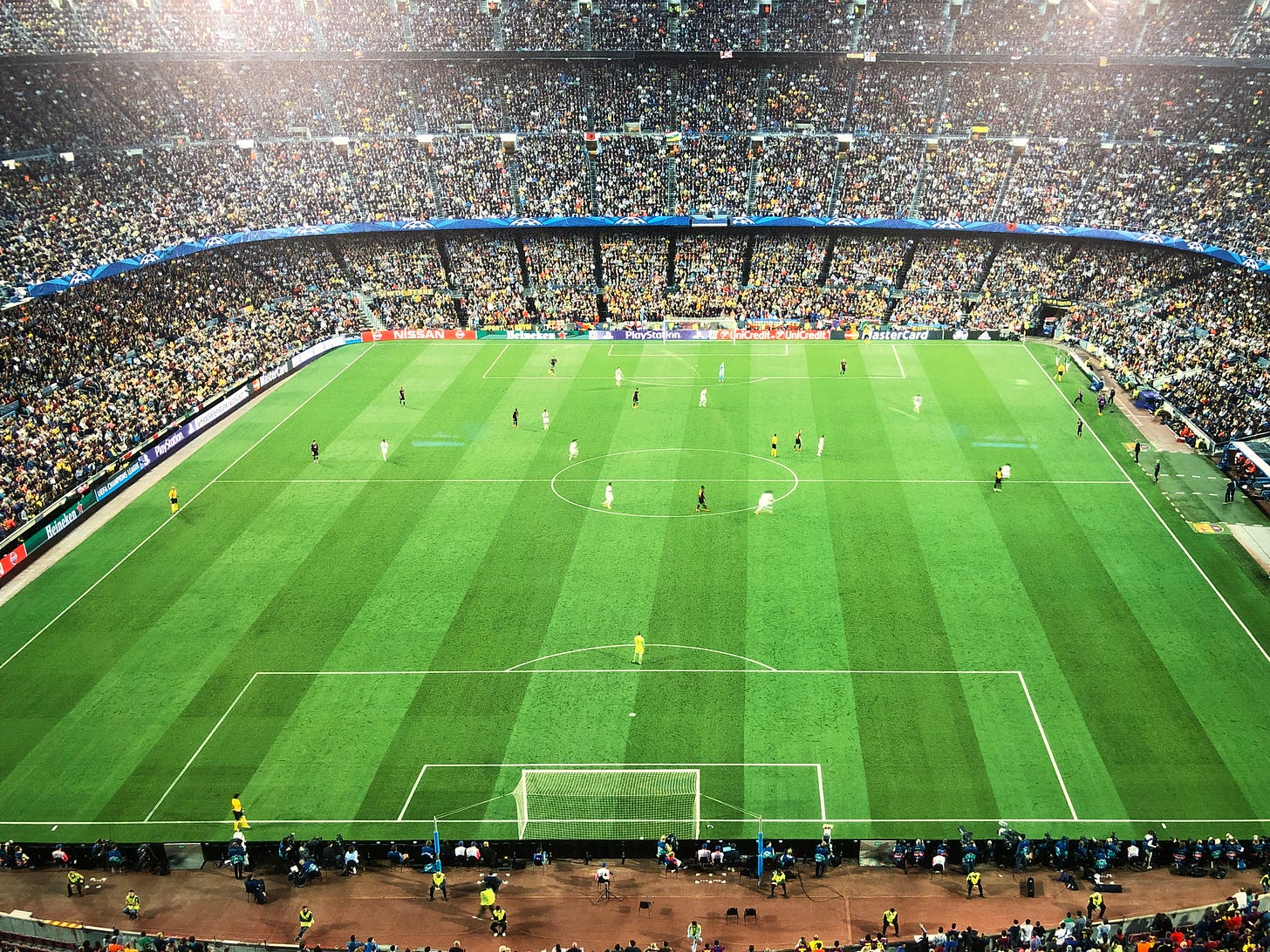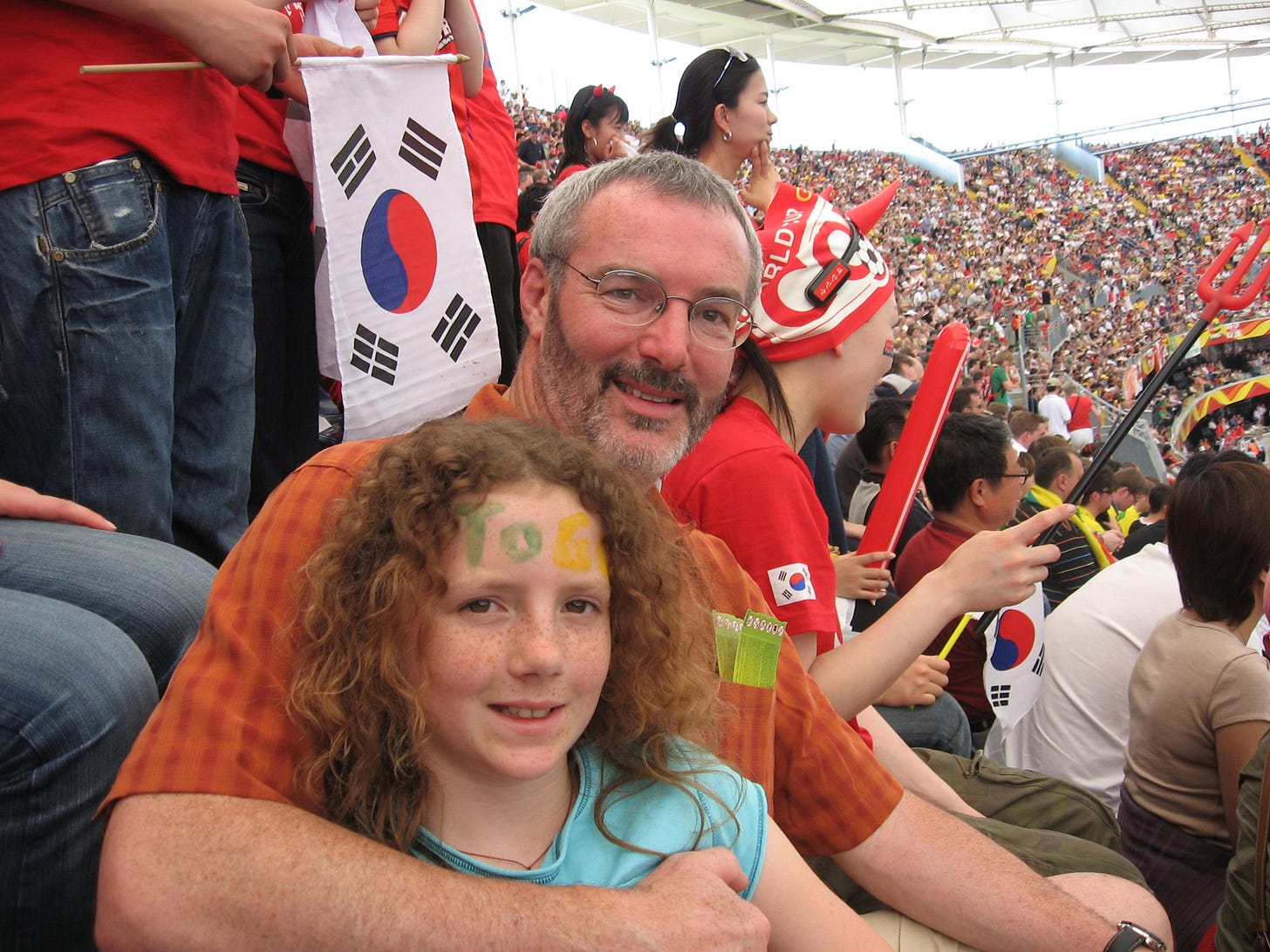Fútbol es vida.
But my knees say otherwise.
Pass me the tapas.
It’s August. That weird no-man’s-land in the sports calendar. Baseball’s on autopilot, drifting toward the inevitable Dodgers-Tigers World Series. The NFL is doing cardio in spandex. College football? Just Deion Sanders hype reels set to trap music. (Go Buffs!) And NBA and NHL players are getting sunburned sipping Molson Exels, and frankly, unavailable. So what better time to talk about the world’s game?
I know, I know. Half of you just bailed. You saw the word “soccer” and went back to doomscrolling or watching a trade deadline recap show. That’s fine. You can catch up with me later. Or after the US wins another World Cup. (Spoiler: They haven’t, and they won’t.)
I can just imagine explaining English Premier League relegation to an NFL Giants, Browns or Titan fan and seeing the real time panic in their eyes. “Wait…my team can get fired?!”
Anyway…living in Spain makes ignoring soccer impossible. You don’t just see it—you absorb it. It’s in the bars, in the cafes, on beach towels, and intense father-son silences. Jerseys outnumber dress shirts here. Even our noticeably awkward expat first dates always start the same: “So…who’s your team?” Every second kid kicks something. And nearly everyone knows who’s up, who’s injured, who’s transferring and what the ref missed.
Fútbol here isn’t sport. It’s social glue. Not just the national pastime—it’s the national language. The only place people speak faster is on a VAR replay*. It’s cultural currency. It’s how Spain communicates across generations and geography. A father and son don’t talk? Put them on the couch for a big game and pass the tapas.
When Barça and Madrid play in El Clásico? The country doesn’t just stop—it argues, bets, cheers, weeps and replays it for weeks. Athletic Bilbao doesn’t sign non-Basque players because of regional pride—which is like that uncle who drinks Pabst, curses hybrids, and calls it patriotism. Here, fútbol doesn’t just unite the country—it shows you where it’s fractured: Catalonia versus Castile, Basques versus the rest, Madrid versus Everyone.
Of course, it’s big business too. La Liga pulled in nearly $5 billion in revenue last season. Real Madrid cracked a billion euros on their own. Barcelona’s right behind, polishing their trophies and cooking the books. Those Spanish teams are more valuable than the Dallas Cowboys, Dodgers or Lakers. (Well, maybe not the Lakers—they did just sell for $10 BILLION!)
And it’s not just domestic. When the Saudi-backed Club World Cup distributed a billion dollars in prize money, Spanish clubs were front and center. That’s not sport. That’s a sportswashing sovereign wealth fund with shin guards, and at this point, FIFA is just a Saudi checking account with a whistle.
My love of the game goes way back. Played it as a kid until I got old enough to legally hit people and switched to the macho Canadian sports trifecta playing football, hockey and lacrosse. But soccer stuck. I coached my kid’s team once (Guy Fieri had the day off)—and let’s just say if enthusiasm could be tactical awareness, we would’ve had an undefeated season. Proud to have watched them both develop into good players. Often game-changers.
And I’ve seen some games, too. Oh, I’ve seen some really good matches from Mendoza to Doha, Ljubljana to Wembley.
May 1985. Wembley Stadium. Liverpool vs. Everton. 98,000 screaming lunatics sitting next to Dave and I. Everton scores first, Liverpool scores three in twenty minutes. Ian Rush is a god. And Liverpool becomes the fifth team ever to win the league and FA Cup double. Not a single Englishman in the starting eleven. The irony was thick. The beer was thicker.
June 1994. World Cup. USA vs. Colombia at the Rose Bowl. 93,000 sweating bodies under the California sun. Escobar’s own goal. Stewart’s rocket. I changed clothes in a limo on the way to a political fundraiser later. Only in L.A. But it was a tragic, iconic match etched in memory because the Colombian drug lords took the loss hard—assassinated Escobar like a dog when he returned home. Ouch.
August 2009. Rose Bowl again. Barcelona vs. LA Galaxy. Barcelona had just completed the treble—that means they owned all the trophies at the time. Crazy game, too. Fans booed Beckham—their hometown player no less—like he’d insulted their mothers. Then he curled in a free kick, and after one stunned collective beat, the boos flipped to applause—like he’d just done their taxes and hugged their moms. Took my daughter. She yelled the loudest. Raised her right. Barcelona wins, of course. But Beckham wins the moment.
Spain’s golden era was something else. From 2008 to 2012, La Roja, the national team, won Euro, World Cup, Euro. The holy trinity of soccer. No one had ever done that. No one likely ever will again. They were so good they made dominance look like choreography. Watching was like seeing jazz musicians play keep-away with the ball. Beautiful. Frustrating. And completely unfair. Tiki-taka, they called it. A philosophy as much as a tactic: if your opponent doesn’t have the ball, they can’t score. Obvious, right? Yet no one else did it like they did.
Spain’s reign didn’t fade so much as evolve. Today, La Roja’s #2 in the world and just won Euro 2024. And over the last quarter-century, they’ve outperformed France, Italy, Germany and of course, England—none of whom have matched Spain’s consistency, flair or tenure of success.
You want to know who the Spanish GOAT is? Ask a group of fans. Then step back and let the chaos unfold. It’s like watching philosophy majors fight in a pub. You’ll hear names like David Silva, Pique, Raul, Sergio Ramos, David Villa, Pedri, Rodri, Jordi Alba, Andres Iniesta and Xavi. Some have birthdays unofficially celebrated on Saint’s days.
And yet, for all its glory, soccer has a shadow side. It’s not just the injuries or the politics—it’s the saturation. Club schedules that never end. Players pushed to play 66 matches a year like Marc Cucurella did this year. 5,400+ minutes. The human body is not supposed to sprint for 90 minutes that often. But greed trumps muscle fiber.
And that’s probably too much. But with national teams, club teams, qualifiers, friendlies, Champions League, World Cups, Olympics—there’s always another game. There’s always another trophy—Pretty sure I watched Sevilla vs. Manchester United for the Carrefour Cup last week! Could’ve been preseason, I don’t know. Could’ve been a fever dream. Always another game on, somewhere.
It’s capitalism in cleats. And it’s grinding players into dust. Soccer players age in dog years. Eight good seasons and suddenly you’re washed up at 29, hosting a podcast called “The Offside Trap.” Half the guys in the Premier League won’t last two. That highly ranked MLS rookie? He’s lucky to make it past year three years. This is the beautiful game, yes. But it’s also a meat grinder with sponsorships.
Still—I love it. The passion. I love the tactics. The randomness. The way one bounce can flip an entire game. I love total football and long-ball chaos, counter-attacks and quick flicks. I love watching Brazil samba their way into the box. I love Iceland qualifying against the odds. I hate parking the bus but respect its utility.
And I’ve picked up a few hard truths over the years. For example: penalty kicks? Shoot it up the middle guys. Seriously. Goalies dive—left or right 98% of the time—more than actors in a Christopher Nolan film. The middle’s open. Always.
Also: that corners rarely work. Less than 3% lead to goals. Most of the time, they just invite a fast counterattack. I think corner kicks are the soccer version of “hold my beer, buddy.” Low odds, high drama and almost always end in disappointment.
Passing? Great in theory. But most goals don’t come from four-pass plays. The guy who just passed the ball is the one to watch—he’s the ghost slipping into a void space.
Score first, and you probably win. Fall behind early? Pray. Late goals are common—more than a third come after the 75th minute. But comebacks? Not guaranteed. And the 2-0 lead is soccer’s version of “What’s the worst that could happen?” It’s a trap. Ask any fan with PTSD.
Shootouts? Go first. Stats say you win 60% of the time if you do. Simple. An edge.
And yes—soccer is part skill, part luck. More than most sports. Basketball is about stars. Hockey about four strong lines. Soccer’s about mistakes. It’s a weakest-link sport. One bad pass, one missed assignment, and everything unravels. Good coaches know this. They don’t scout your stars. They hunt for your cracks.
But that’s the magic—the dink chips. It’s unpredictable—the screamers. It’s unfair—Erling Haaland’s instincts. It’s brutal—van Dijk on D. And it’s gorgeous—Messi on ball.
It’s beautiful and it’s life, with cleats on.
And I wouldn’t have it any other way. Fútbol es vida.
*BTW: The Video Assistant Referee (aka VAR) is proof that even with 47 angles, 4 officials, and 14 minutes of analysis, no one really knows what a handball is in soccer.
Thanks for the privilege of your time, it is the most precious thing we have, and I appreciate it. Be well.
William D. Chalmers © 2025 All Rights Reserved.



